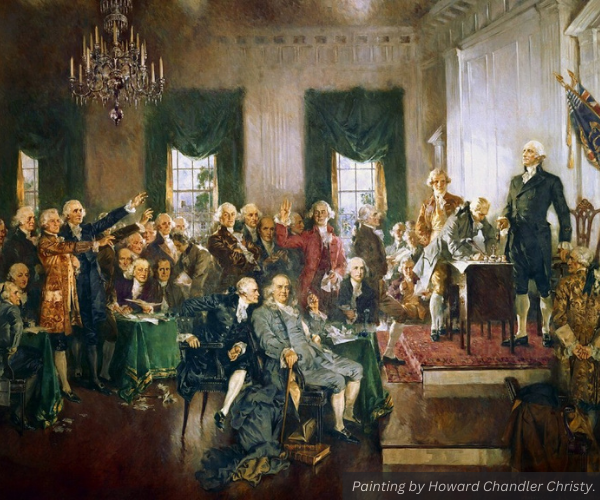“Our Divine Constitution” is the second of four articles focused on defending the U.S. Constitution. These articles, written by The Byway‘s four editors, were published in the newspaper’s most recent September paper. Read the first article, “Three Branches, One Government,” here.
God’s guiding hand in support of freedom has been a recurring theme throughout America’s history. From the prophets referred to in the Book of Mormon in ancient times, to the pilgrims and the Mayflower Compact, to the Founding Fathers and up to today, the pursuit and establishment of freedom as guided by Heavenly Father has motivated their bold actions.
In addition to the Bible, members of the Church of Jesus Christ refer to several books of scripture for guidance and inspiration including the Book of Mormon and the Doctrine and Covenants. It may surprise some readers that these books and the teachings of the prophets include references to the Constitution of the United States and principles that support the importance of freedom.
Members teach that in the Book of Mormon, Lehi, an ancient Jewish prophet who was guided to the Americas in 600 B.C., knew that as long as he and his posterity would obey the laws of God, they would remain free. Successive generations and prophets repeated this understanding, especially after witnessing the destruction of people who had turned away from God.
Later, in 100 B.C., Captain Moroni rallied his troops with a banner he called the Title of Liberty: “In memory of our God, our religion, and freedom, and our peace, our wives, and our children.” His army was fighting in defense of these rights.
In 1620, the pilgrims came to America seeking the right to worship as they wished. They laid a foundation of freedom in the Mayflower Compact, the first modern contract drawn up by individual citizens independent of a monarch that acted as a foundation for our current Constitution. One of the tenets was that they would live according to the Christian faith.
Some people in those early days believed America had a “Manifest Destiny” as a special place among the countries of the world. The definition of Manifest Destiny began as a religious belief, that there was something special about America’s role in religious and other freedoms that other countries did not offer. The Puritans came to America in 1630, for example, believing that their survival in the new world would be a sign of God’s approval. The definition of Manifest Destiny morphed over the following decades however, away from that original definition.
The Framers Believed
The Founding Fathers felt a keen responsibility to uphold this country, sacrificing their lives and property for what they believed was a divine destiny.
President Wilford Woodruff, the prophet of the Church of Jesus Christ of Latter-Day Saints, said in 1898, “Those men who laid the foundation of this American government and signed the Declaration of Independence were the best spirits the God of heaven could find on the face of the earth. They were choice spirits…[and] were inspired of the Lord.”
In 1787, those Founding Fathers had put their minds to creating a government to better suit the nation, and for a whole summer, they gathered in an assembly to draft a Constitution.
Despite their individual abilities and strengths, no progress was made for weeks in the assembly. Benjamin Franklin called on them to offer prayer. Franklin said the following:
“I have lived, Sir, a long time and the longer I live, the more convincing proofs I see of this truth — that God governs in the affairs of men. And if a sparrow cannot fall to the ground without his notice, is it probable that an empire can rise without his aid? We have been assured, Sir, in the sacred writings that ‘except the Lord build they labor in vain that build it.’
“I firmly believe this; and I also believe that without his concurring aid we shall succeed in this political building no better than the Builders of Babel.
“I therefore beg leave to move — that henceforth prayers imploring the assistance of Heaven, and its blessings on our deliberations, be held in this Assembly every morning before we proceed to business, and that one or more of the clergy of this city be requested to officiate in that service.”
From that day forward the heated debates continued, but progress was made.
George Washington and the Founding Fathers of this American nation were then led and guided by divine instruction to write an inspired Constitution that would ensure the God-given freedoms of life, liberty, and the pursuit of happiness.
It seemed daunting, even impossible, but later George Washington wrote, “It appears to me …little short of a miracle, that the Delegates from so many different states [with such diverse differences from one another] should unite in forming a system of national Government…”
James Madison, known as the father of the Constitution, recorded in Federalist Paper #27 about the process of writing the Constitution, “It is impossible for the man of pious reflection not to perceive in it a finger of that Almighty hand which has been so frequently and signally extended to our relief in the critical stages of the revolution.”
In a revelation to the prophet Joseph Smith, the Lord stated, “I established the Constitution of this land, by the hands of wise men whom I raised up unto this very purpose.” (D&C 101:80).
Ezra Taft Benson’s Thoughts
Another significant leader who is passionate about our God-given rights preached in more recent times about the importance of upholding them and supporting righteous governments.
In 1943, Ezra Taft Benson was sent to Europe to help with post-WWII relief efforts. This experience instilled in him a strong anti-communist passion. He later served as the Secretary of Agriculture under Dwight D. Eisenhower for eight years and opposed subsidized payments for farmers, based on his understanding of constitutional tenets. He promoted price adjustments instead. He implemented constitutional principles in all his decisions.
Mr. Benson was ordained as President Benson, prophet of the Church of Jesus Christ of Latter-day Saints in 1985. His experience in Europe and government galvanized his appreciation for the Constitution. In a church devotional, he shared these principles:
- Men should all have the agency to choose the course they would follow, rather than be coerced and forced to follow a government’s restrictions.
- The most important single function of government is to secure the rights and freedoms of individual citizens as outlined in the Declaration of Independence.
- It is wrong to believe that governments are the ones who grant human rights, and therefore can withdraw those rights. People have the rights, not the government.
- The government should have only limited powers. People can only give to the government those powers which they possess. It cannot claim the power to redistribute money or property since that is not the people’s right in the first place.
The Constitution is an inspired document written by divine design, not just for Americans, but as a guide for all people. It has served as a model for many other countries for 235 years. In a statement that sounds similar to Manifest Destiny, but without expansion, capitalism, and enslaving tones, President Benson stated:
“It is my firm belief that the God of Heaven raised up the founding fathers and inspired them to establish the Constitution of this land. This is part of my religious faith. To me this is not just another nation. It is a great and glorious nation with a divine mission to perform for liberty-loving people everywhere.”
Perhaps we have yet to see what this nation’s divine purpose is.
This brings us to today. What is the role of the Constitution in our lives? What is our role in preserving its intended purpose?
President Ezra Taft Benson encouraged everyone to do the following:
- We must be righteous and moral. To live a higher law means we will not seek to receive what we have not earned by our own labor.
- We must learn the principles of the Constitution and then abide by its precepts.
- We must become involved in civic affairs. We cannot do our duty and be idle spectators.
- We must make our influence felt by our vote, our letters, and our advice. We must be wisely informed and let others know how we feel.
As we increase our understanding of this divine document, our appreciation and alarm increase. It has indeed been attacked by those who would gain power by its destruction. Benson said,
[The Constitution] will not be saved in Washington. It will be saved by the citizens of this nation who love and cherish freedom…men and women who will subscribe to and abide by the principles of the Constitution.
There are some who apparently feel that the fight for freedom is separate from the Gospel, that there’s no need to get involved in trying to save freedom and the Constitution or stop communism….
Should we counsel the people, ‘Just live your religion – there’s no need to get involved in the fight for freedom?’ No, we should not, because our stand for freedom is a most basic part of our religion.
Preserving the Constitution
We must be vigilant, involved, and proactive in defending this divine document, no matter what our personal religious beliefs. We all have the right of freedom. Let us unite in preserving it.
John Adams, second president of the United States observed, “Our Constitution was made only for a moral and religious people. It is wholly inadequate to the government of any other.”
With heavenly endorsement, we already have an inspired Constitution. Rather than re-writing the document that has lasted longer than any other governing constitution, perhaps we should look at our own lives and revise them. How can we be more aligned as citizens with the divine tenets others sacrificed to give us?
Rather than accept the evolved Manifest Destiny definition of America as being entitled to expansion, slavery of others and capitalism where the almighty dollar determines our future with its accompanying power, let us reclaim the values of our forefathers of honesty, integrity, respect, a work ethic, and responsibility and accountability.
Our 16th president of the United States counsels us with this answer. President Abraham Lincoln stated, “Let [the Constitution] be taught in schools, in seminaries, and in colleges, let it be written in primers, in spelling books and in almanacs, let it be preached from the pulpit, proclaimed in legislative halls, and enforced in courts of justice. And, in short, let it become the political religion of the nation.”
Only when we understand it can we support it. When we support it, we will reap the benefits that God intended for us.
– by Karen Munson
Feature image caption: The Constitutional Convention of 1787 in Philadelphia, painted by Howard Chandler Christy in 1940.

Karen M. Munson – Escalante
Karen is an associate editor at The Byway. She is fascinated and fulfilled by all things involved with writing. After graduating from BYU, she taught English at Escalante High School for three years. She pursues opportunities to write and support others in their writing. Karen has published three books with four more scheduled to be released in 2024. She and Reed are the parents of ten children and the grandparents of 35 grandchildren.
Karen is the author of the New Twist on Mental Health column in The Byway.

